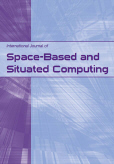Please directly send the paper to Special Issue on Towards
Ubiquitous Computing based on Smart Internet of
Medical Things via the submission link as below. (https://www.inderscience.com/mobile/journal/insubmithere.php?jcode=ijssc)
(Note: Please write BDET
2021, in "Notes for the Editor")
Papers accepted in the special issue will be invited
to present at BDET 2021.
|
|
 |
International Journal of Space-Based and
Situated Computing (IJSSC) for Special Issue on Towards Ubiquitous Computing based on Smart Internet of Medical Things Submission Deadline: 30 April 2021 Submission System for the special issue (Note: Please write BDET 2021, in "Notes for the Editor") Indexed in: Emerging Sources Citation Index (Clarivate Analytics), Academic OneFile (Gale), cnpLINKer (CNPIEC), DBLP Computer Science Bibliography, Google Scholar
|
|
|
|
Guest Editors:
Prof. Dr. Jie Chen, Shenzhen University, China Prof. Dr. Yu Shen, Tongji University, China Prof. Dr. Yehong Zhang, Peng Cheng Laboratory, China |
Aim & Scope
International Journal of Space-Based and Situated Computing
(IJSSC) is soliciting papers for the special issue on Towards
Ubiquitous Computing based on Smart Internet of Medical Things.
The Internet of Medical Things (IoMT) is an extension and
specialization of that original Internet of Things(IoT) concept,
and applies to the interconnectedness of devices, software
applications, and data which are specific to the medical
industry. IoMT can add smart technologies to medical devices to
monitor the progression of a disease away from the doctor’s
office and learn things that could impact future care guidelines
and patients. It can also provide a better way to care for our
elderly by tracking vitals and heart performance, glucose and
other body systems, and activity and sleeping levels. During
outbreak of pandemic(e.g. COVID-19), IoMT can even be used to
detect main symptoms ubiquitously using intelligent sensors and
trace the origin of outbreak based on aggregated IoT data (e.g.,
geographic mobile data, purchase history). Research on Affective
computing has defined a framework to recognize, interpret and
process human affects, but more research is needed to
investigate its application to biomedical applications,
especially “in the wild” and over extended periods of time. This
special issue aims to create a platform for researchers,
developers and practitioners from both academia and industry to
disseminate the state-of-the-art results and to advance the
ubiquitous computing in IoMT.
The areas of interests include, but are not limited to:
-
IoMT for disease detection, contact tracing and monitoring
-
Wearable sensor and device for IoMT
-
Multimodal data pre-processing technique for IoMT
-
User personalization with IoMT
-
Mobile, tangible and virtual/augmented affective interface for IoMT
-
Hybrid human and machine intelligence in IoMT
-
Affective databases and annotation tools for IoMT
-
Security, privacy, integrity of multimodal data in IoMT
-
Human-centred interaction design for IoMT
-
Ethical issues in IoMT